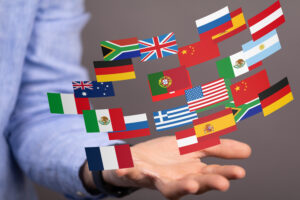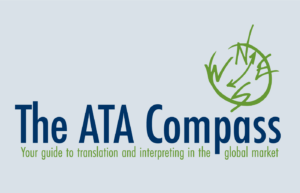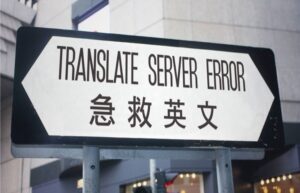The High Cost of Cheap Translation
Why You Shouldn’t Skimp When Leaping the Language Barrier
You pay for the best product development and manufacturing. Your legal and administrative people are top-notch. You choose your advertising and marketing partners with utmost care.
And then you pick the lowest bidder for your translations. There’s a good chance you’ve just made a costly mistake.
Size Does Not Mean Quality
A nationwide big-box retailer went shopping for translation services for signage and advertising work. It settled on a large translation agency offering an impressive pitch and attractive prices. The retailer announced that henceforth all translation work had to be sent through the chosen translation firm.
Pleased with the decision, the retailer had no way of knowing the product would never match the promises. In the translation world, size does not translate into quality. Economies of scale are slight. Like the smallest agencies, the chosen large firm routinely sends projects to freelance translators. The quality of the people they enlist has everything to do with the rates they pay and, consequently, the fees they charge the retailer.
Paying for a Job Twice
When the retailer’s staff began receiving the finished translations, they could tell the quality was awful. They realized, though, that sending the texts back to be improved would be cumbersome, costly, and ineffective. And they were not allowed to contract work out to anyone else.
So what did they do? They sent the work to a high-quality boutique translation agency to translate all over again—naturally at a higher price than for the shoddy version. And how did they pay for it? They buried the extra translation jobs in the corporate budget for graphic design.
What Can Go Wrong?
The folks on the front line at your company may not have as quirky a story of “cheap” translation to recount. But in other ways, a low-ball translation provider can end up costing you money, quality, management time, image, and reputation.
1. Bait-and-Switch Tactics:
An agency may show you résumés of the professionals who will be translating your texts. The paths that bring people to a translation career vary greatly, and no single set of criteria guarantees an excellent translation. However, you can look for certain things: academic degrees, serious language study, and in-country work experience.
But beware—unscrupulous agencies solicit résumés of people with skill levels well above what the agency is willing to pay for, show them off to unwary clients, and source the translations from others who will settle for far less money. In some cases, they even “harvest” résumés from the Internet for this purpose.
So how do you know? Find out whether the agency head or representative is a translator (many are not), and quietly assess on your own whether that person takes language, the profession, and your service needs seriously. Ask questions and trust your gut. Ask for and check references of satisfied clients in the same language combination.
If you find the agency trustworthy, you may want to ask for a specific translator from the résumé lineup.
2. No Review Process:
The agency’s offer may sound like a good deal, but there may be no proper review process in place. This low-bid “envelope changer” receives the translation, gives it a quick once-over—or not!—and sends it on to the client.
Good translation providers always budget for a second person with similar skills and expertise in your field to perform a careful edit of the translation, often paying a third or more of what the translator receives. Some top-notch firms go beyond this “four-eyes” principle to six eyes—a third person may have a final look-through to make sure all is in order.
If you are working directly with an independent translator, expect that person to price in a review by a respected colleague.
3. Over-Reliant on Machine Translation:
The agency or translator may be over-reliant on machine processes. While machine translation and specialized translation software have made great strides, there is widespread agreement among top translators that these are only aids and occasional shortcuts to a quality product.
They do not in any sense replace the need for thorough engagement with the text by both the translator and reviewer.
4. Clunky Writing:
Clunky writing may detract from your message. Good translators are always honing their writing skills on and off the job. They read widely, with attention to good writing, and focus on the skill in professional development sessions. Even good writers who embark on a translation career find it takes time to learn to make a text flow.
When this skill is lacking, your translation may have the inescapable sound of—well, a translation. Subtleties crucial to your message may disappear. In a marketing text or in any high-level communication, this may mean missing the boat entirely.
The saving of a few hundred or a few thousand dollars on translation may translate into a sacrifice of millions in potential revenue.
Teamwork
You need a team of intelligent, highly trained professionals for your translation work. They have experience in your industry in addition to their foreign-language expertise. They are fine, polished writers, translating only into their native languages despite their near-native fluency in other languages. Keep all this in mind when you go shopping for language services.
The result will be worth the price.
About the Author
Stephanie Tramdack Cash, CFA, translates French investment management and strategy documents. She is an active member of ATA.
ATA is Making News
ATA provides content for professional and trade publications to spread insight to a wide range of readers. This article appears in the following publications:
- Article Weekly (July 20, 2016)
- Home Business (August 24, 2016)
- RIS Media (October 11, 2016)
- Phoenix Association of Realtors (October 11, 2016)
- Focus on Fashion Retail (December 2016)
- The Cutting Edge (January 2017)
- Information & Communication Tech Solutions (June 1, 2017)
1 Comments
Leave a Comment Cancel Reply
Language Services Directory
Subscribe to The ATA Compass
Connect with The ATA Compass
Recent Posts
Machine Translation
What is machine translation? Machine translation (MT) is the use of automated software that translates text without human involvement. Adaptive MT is a technology that learns and adjusts in real-time…
Read MoreExploring Translation and Interpreting Services
Why Are Language Services Essential in an Internationalized World? In a world where communication knows no bounds, effective language services are paramount. ATA helps you find professional translators and interpreters…
Read MoreThe ATA Compass
Want to reach more customers, grow your business, and improve your bottom line? The ATA Compass publishes articles and provides resources to show you how language professionals can help you…
Read MoreFind a Translator or Interpreter Near You
Searching for a Nearby Translator or Interpreter? Whether you require accurate document translations, real-time interpreting for an event, or specialized industry expertise, finding the right professional near you has never…
Read MoreBuying Language Services
Guide to Buying Translation Services Translators help power the global economy, working with businesses, governments, non-profits and individuals. Translators work with the written word. The ATA Guide to Buying Translation…
Read MoreWhy Should I Hire a Professional?
It takes more than just the ability to understand two languages. Professional translators and interpreters have the education, experience, and expertise to understand the nuances in one language and transfer…
Read More







Buying translation is like buying a car. You usually get what you pay for (smile)